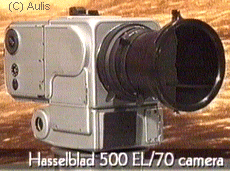正文
这个也是个老帖子,翻出来重贴一下为了庆祝“嫦娥二号”发射成功!
美国人“登月”的阿婆锣项目用的照相机和胶卷(图)
庄冬
这是我从网上抄来的。我瞎翻译一下。大家凑合看吧。

美国人“登月”的阿婆锣项目用的照相机
关于美国人“登月”的阿婆锣项目用的照相机
Hasselblad were the manufacturer of the camera that took all of the photos on the Apollo missions. Jan Lundberg was the Manager Of Space Projects at Hasselblad from 1966 to 1975 and responsible for the production and building of the Hasselblad 500 EL/70 cameras that were used on the Apollo Missions. He says 'Originally NASA made all the alterations themselves, then they presented what they had done to us and asked if we could do the same, to which we replied yes we can, and we can do it better. We proceeded to make the alterations that were accepted by NASA.' Protective plates were added to the case and film magazine.
美国人“登月”的阿婆锣项目的全部(all)照片(photo)都是用Hasselblad生产的Hasselblad 500 EL/70 型照相机拍摄的。1966到1975年,Jan Lundberg 是Hasselblad的空间项目经理,负责生产阿婆锣用的Hasselblad 500 EL/70 型照相机。他说开设时NASA做了一些改动,后来他们给我们看了他们的改动问我们是否可以做,我们回答说我们可以做得更好。NASA接受了我们的产品。机身和胶卷合加了保护板。
关于美国人“登月”的阿婆锣项目用的胶卷
H. J. P. Arnold is an astronomer and keen photographer, an expert on space and astrophotography and was the assistant to the Managing Director at Kodak during the Apollo years. He has authored many space photography books. He comments that the film that was supplied by Kodak for the missions was essentially the same as used here on Earth. it was ektachrome 64 ASA or ISO as it is called today. He has commented that you would expect to see some small dots on the films where a high velocity nuclear particle had hit the film, however no evidence of this whatsoever has come forward. The only thing that would protect the film from this damage would be a thick layer of lead around the camera casing, which according to Hasselblad was not used. Let's also remember that the films were changed whilst outside on the Moon's surface and not in a controlled environment.
H. J. P. Arnold 是一名天文学家和摄影爱好者,是空间摄影方面的专家。在阿婆锣项目的时候,他是柯达的Managing Director的助理。他还写过一些空间摄影的书。他说阿婆锣项目用的胶卷基本上(essentially)就是地球上用的胶卷,当年叫ektachrome 64 ASA现在叫ISO 。他还说由于高速粒子打击胶卷,预料可以期看到在胶卷留下一些小斑点,但是没有看到任何有过斑点的痕迹。唯一保护胶卷的是保护照相机的一层铅板,据Hasselblad(生产阿婆锣项目的照相机的厂家)说当时没有使用保护铅板。请大家都记住换胶卷是在月亮表面而不是在有控制环境的条件下进行的。
阿婆锣宇航员在“月亮”带照相机的照片

照相机就是直接挂在胸前
An important factor to take into consideration is the great variations in temperature that the film would have had to endure whilst on the lunar surface. The temperature during the Apollo missions were recorded as being between -180F in the shade to an incredible +200F in full Sunshine. How could the film emulsion have withstood such temperature differences? The astronauts can be seen to move between the shadows of the rocks and then into full sunlight in some shots. Surely the film would have perished under such conditions?
一个重要的因素是胶卷必须承受的月亮表面的巨大温差。在阿婆锣项目的时候,月亮表面的温度记录是阴处-180度华氏(-118度摄氏)到阳处+200度华氏(+93度摄氏)。底片怎么可能在这种温差下保持正常呢?阿婆锣项目的宇航员也从石头的阴影处到阳处。胶卷在那种情况下肯定是要完蛋滴。
********************************************
最后,跟大家分享几个事实。
航天器分近地距离、中距和远距离三种,进地几百公里、中距差不多上千公里等等。这主要是因为这三个距离的飞行环境不同因此对航天器的设计要求也不同,因为地球的大气是随着离地球的距离逐渐消失的,所以距离地球不同距离上的日照时间和所要承受的来自太阳的辐射也是逐渐增强的。
1,美国人的几次“登月”都是选择在太阳活动比较最剧烈的时候做的,也就是太阳辐射比较最强的时候,所以宇航员穿过The Van Allen radiation belt所要经受的辐射也是比较最强的,因此是比较最危险的时候做的。
2,事实是人类航天到目前为止只有近地轨道的载人航天和超远距离的所谓“美国人的登月”,也就是说从来没有人做过中距离和远距离的载人航天就直接去月亮了。
3,除了一个之外所有人类航天的第一(比如说第一个卫星、第一个行星、第一个绕月亮、第一个载动物航天、第一个载人航天、等等等等)都是属于苏联人的,只有第一个“登月”是美国人的。
4,美国人的“登月”方法是全部都装进一个火箭里面一锅烩是最困难的也是最危险的方法。现代系统工程理论都可以算出这样作需要的资源,比如说钱和通信能力等等,阿婆锣项目用的计算机还不如今天的一个电子表呢。
5,一个神七就涉及几百上千个公司。几乎没有几家美国公司号称为登月干过事儿................ 当年美国人号称“登月”那么多次,几乎跟每年例行的度假一样年年登月。可是我现在还没见过几个公司号称他们对“登月”作过什么贡献。而跟那几个航天飞机有关的公司们则经常作广告说他们对航天飞机作过什么贡献。现在号称跟“登月”有关的美国公司只有TWR一家了。
6,航天飞机都产生了很多民用产品,登月好像一个也没有吧?至少我从来没有看见过任何广告宣传。
7,人家美国人也不是个喜欢害羞对自己的成就掖掖藏藏的,可是怎么就看不见几个公司说他们为美国人登月做了什么贡献呢?
当然还有一个问题,就是美国人“登月”项目的经费也就是说“登月”项目所花的钱究竟到那里去了呢?
最最后,我祝愿中国人的空间站的走两步的方法登月成功!
评论
目前还没有任何评论
登录后才可评论.




